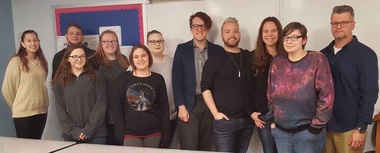Queer: A legitimate field of inquiry

by Michael Lane
Journalism Intern
"People can be a bit overwhelmed at the breadth of LGBTQ+ history in the United States," said Aaron Bachhofer, a professor at Rose State College. "After all, for many students under the age of 25 or so, queer life began in the 2000's with the many debates over marriage equality.
"The notion that binary sexual identity descriptors are a late 19th and early 20th-century manifestation confounds, and evidence that same-sex couples lived – some thrived – during the American colonial period just blows people away."
Bachhofer has taught Introduction to LGBTQ History since 2008 at Oklahoma City University, Oklahoma State University and started teaching it at Rose State College in 2009.
"The materials remain fresh and timely.... Some of my colleagues did not see the history of sexuality generally – or LGBTQ+ history specifically – as a legitimate field of inquiry. They were wrong."
Bachhofer remarked about his start in this field, "I knew a lovely queer couple in OKC who had been together since the 1930's. They talked about how much fun they had, and how being open about their relationship here in Oklahoma was no more or less troublesome than it had been for friends in other parts of the U.S.
"This interpretation seemed at odds with the canonical description of life in Oklahoma for LGBTQ+ residents. I also read George Chauncey's Gay New York, and I was hooked.
"I decided to apply Chauncey's research methodology to Oklahoma City for my dissertation, and the rest is, well, history. I am also a member of the family of course, so there is that."
The course is for everyone, queer or not. "Probably 75 percent [of students] identify as queer. The other 25 percent seem to take the class because a close family member or friend is queer, and they want to learn about LGBTQ+ issues.
"I had a wonderful mix of students when I offered this class recently, a group that included students from all across the LGBTQ+ spectrum, as well as a deeply religious woman who was not ready for some of the topics and language used in the course," Bachhofer reminisced.
"She came to every class session, but gave me some pretty wild looks at first, and some of her expectations about the LGBTQ+ community offended some folks. By the end of the semester, however, she was sharing and learning from classmates.
"It was very gratifying to see students lower their guard, learn something about other people, and realize that so many of our struggles resonate across the board - gender, racial or sexual identity variances be damned!"
This class can be used towards nearly any college major and covers American history as far back as the 1600's. "In my opinion, ‘going global' is just not possible with this course.
"Reading about sodomy court proceedings in Nuevo Mexico, discussing Abraham Lincoln's longing correspondence to Joshua Fry Speed, and watching The Wizard of Oz all provide the historical context for LGBTQ+ history before World War II, and that depth of analysis would be missing in a global format.
"The class has become more political over the years. About five or six years ago I added movie critiques to the curriculum. We use these films to chart the level of LGBTQ+ phobia over time – very effective, and fun! I am toying with another change, too, but I am not going to discuss that yet as it is still in the planning stages," Bachhofer teased.
Bachhofer said his favorite LGBTQ+ characters from history are Bayard Rustin and Radclyffe Hall. "Bayard Rustin was a towering figure in the civil rights movement, but his homosexuality led Martin Luther King and others to relegate him to the shadows. Many people have no idea that Rustin, not King, was the mastermind of the 1963 March on Washington.
"Radclyffe Hall wrote a powerful book about lesbianism and love entitled The Well of Loneliness. Its frank treatment of open lesbian sexuality, along with her very unconventional attitudes about gender, made Hall a pioneer for queer people in the 1920's and beyond."
Bachhofer emphasizes the importance of remembering queer activists throughout the history of America, like gay activists who picketed the White House or sued the federal government for job discrimination in the 1950's.
"I appreciate the hard work and activism from a publication like The Gayly. It provides LGBTQ+ people, as well as straight allies, with invaluable information and perspectives," Bachhofer added. "[The Gayly] possesses such a long and storied place in the Oklahoma LGBTQ+ community!"
Copyright The Gayly – January 5, 2018 @ 10 a.m. CST.





